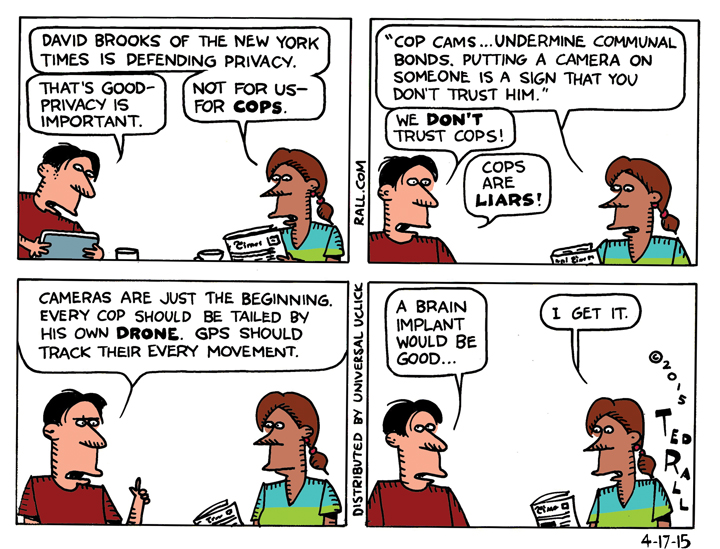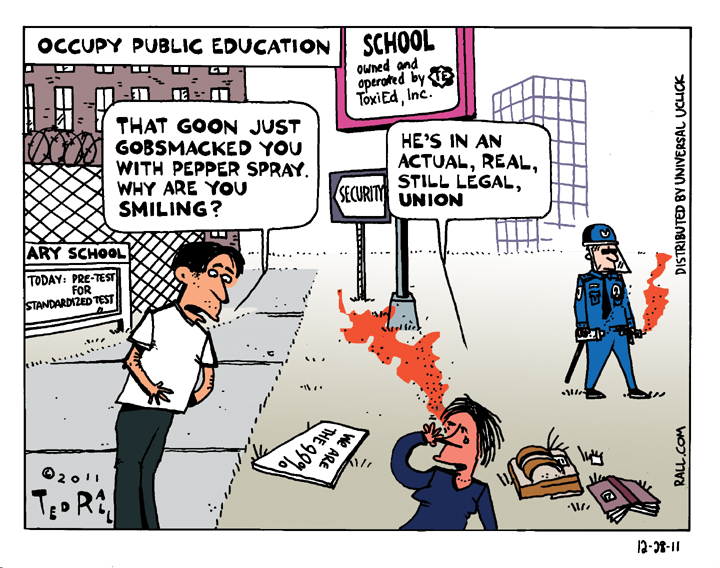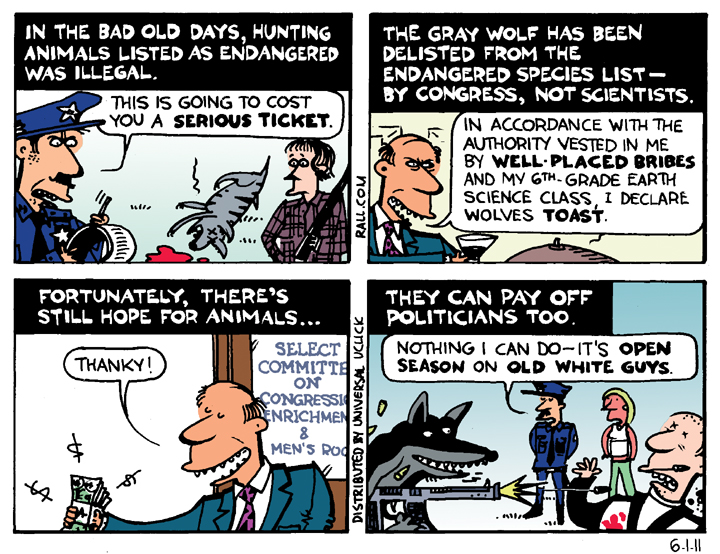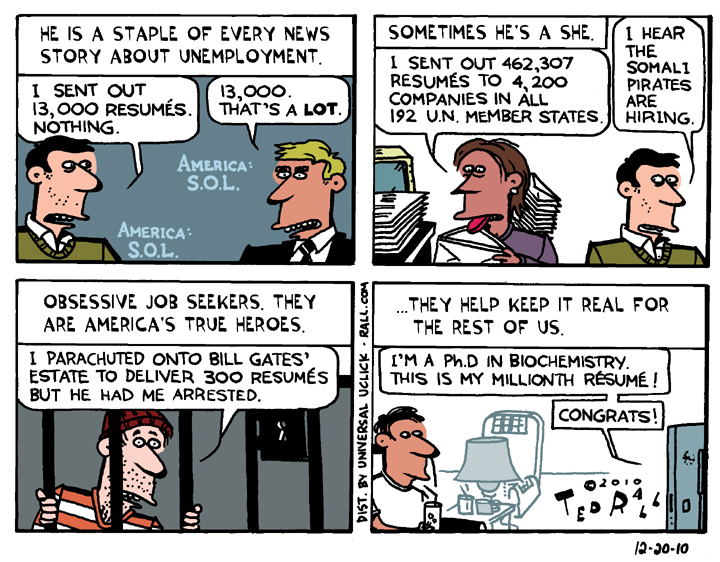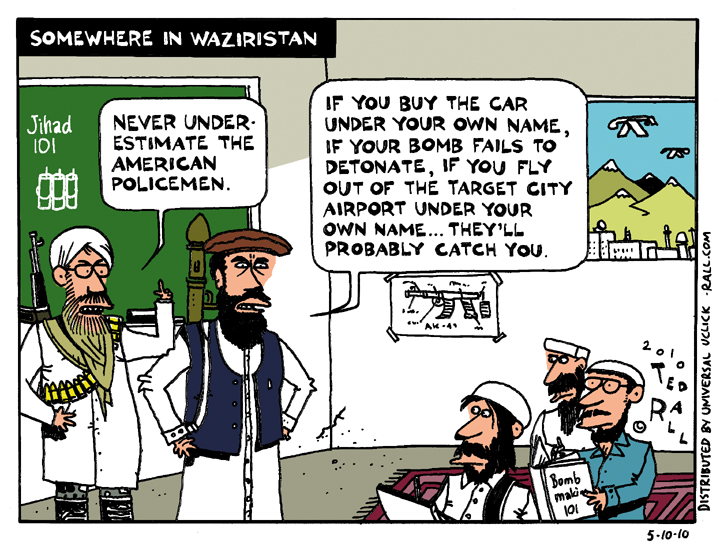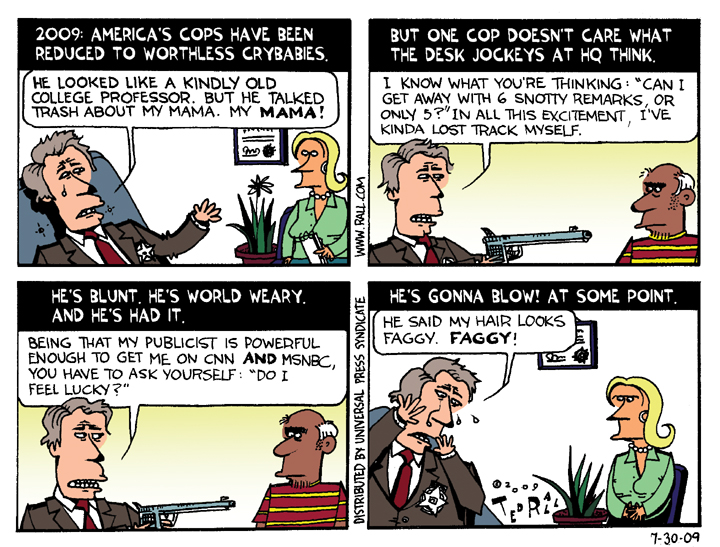New York Times columnist David Brooks came out in a recent column as a strident proponent of privacy. Not for you and me, mind you, but for policemen whose right to privately beat people will be infringed upon by body cameras.
SYNDICATED COLUMN: Wimpy Cops and Scared Soldiers: Why Are Americans Such Cowards?
America has a problem that afflicts both her foreign policy and domestic affairs: cowardice.A nation of wusses. That’s us.
That’s not how we see ourselves, of course. Whatever our flaws – impetuousness, naïveté, our sense of exceptionalism – few Americans count pusillanimity among them. For conservatives bravery as a national trait is a given; if anything, progressives wish we’d walk it back a bit, toning down the testosterone in favor of a little humility.
From the outside, however, we look like a nation happy to inflict all manner of mayhem on people all over the world, yet unwilling to put our own precious skins in the game.
Drones are the ultimate manifestation of America’s newfound risk aversion. After more than 12 years of remote-controlled aerial killer robot warfare, the statistics are undeniable: unmanned aerial vehicles are a ridiculously sloppy assassination method that kills anywhere from 28 to 49 times more innocent civilians than targeted alleged terrorists. With the myth of accuracy thoroughly debunked, drones remain popular with the public for one reason: they don’t expose American soldiers to return fire.
What we see as an advantage, however, sparks contempt among foreigners that our adversaries in this war for hearts and minds exploit in their recruitment and fundraising efforts. You see it in the faces of the Afghans and Pakistanis I have interviewed: if the United States military had any honor, they say, it would come and face our warriors man to man, on the battlefield, rather than pushing a button thousands of miles away. Every “terrorist” we blow up makes us look worse.
Moreover, cowardice is unproductive on a psychological level.
During the early years of the American occupation of Iraq, British forces (who patrolled the region around Basra) suffered lower casualty rates in the zones under their control than their American counterparts. One reason, according to military psychologists, is that British troops presented themselves as more willing to expose themselves to the Iraqi public and less afraid of being hurt or killed. Whereas US forces wore wrap-around sunglasses and set up checkpoints behind sandbags and blast walls, sometimes identifying themselves only by shooting at approaching cars – which caused confused Iraqis to floor the gas, prompting US forces to kill them – the Brits acted more relaxed, like traffic agents standing right out on the road. Americans covered themselves with Kevlar and automatic rifles; the British wore formfitting uniforms, eschewed helmets and satisfied themselves with sidearms. Sunglasses were banned. The American approach seemed safer, but the opposite was true. It’s easier to shoot at something – the Americans looked like fascist robots – than someone.
For a country that used to pride itself on a certain stoicism, the United States has become a land of whiny little boys and girls.
Oh, how we cried after 9/11. 3000 dead! Those “Wounded Warrior” TV ads asking for donations to support Afghanistan and Iraq war veterans – excuse me, but why am I spending 54% of my federal tax dollars on defense if I also have to donate to a sketchy charity? – use the same melancholy tone and weepy delivery as Sally Struthers’ classic “save the children” messages. Obviously, it sucks to lose your arms and legs, but let’s grow a pair. Fewer than 7,000 Americans got killed invading two countries they had no business in in the first place.
Let’s put those numbers into proper perspective, shall we? The Soviet Union lost 20 million people fighting the Nazis (who invaded them, by the way). France lost 11% of its population during World War I — the equivalent for us would be 34 million Americans. But the Russians or French don’t bitch and moan as much as us.
Speaking of which, Americans have a lot of balls calling Frenchman “surrender monkeys” considering that nearly twice as many French soldiers were killed in in the 1940 Battle of France over six weeks as the United States lost in Vietnam over the course of a decade. Meanwhile, we’re still whining about the 58,000 we lost in – no, invading – Vietnam.
Here at home, we’re infested with wimp cops.
In recent weeks, we have been treated to grand jury testimony in the shootings of two black men, Michael Brown in Ferguson, Missouri, and Eric Garner in Staten Island, New York.
Both killer cops are bruisers — big, muscular guys. Most of all, they are cops. Cops have partners. They have the backing of the state. They carry tasers. They have nightsticks. They go to the police academy, where they train long hours in the art of subduing human beings. And as we well know, they have access to military style hardware and defensive gear.
As these two sniveling wimps tell the tales, however, they were in desperate fear of their lives.
From two guys, both now dead, who were morbidly obese.
Not to mention unarmed.
Ferguson police officer Darren Wilson (6’4″ 210) claimed that Brown (6’4″ 292) terrorized him. “I felt like a five-year-old holding onto Hulk Hogan,” he testified. Brown “had the most intense aggressive face,” he said. “The only way I can describe it, it looks like a demon, that’s how angry he looked.”
The NYPD’s Daniel Pantaleo told a grand jury that, after he got his arm around Garner, he was terrified that the two of them would crash through the thick glass window of a storefront they were leaning against.
Both grand juries declined to indict the cops.
Sure, these were the testimonies of two heavily lawyered defendants following a script that has gotten countless white policeman off the hook for killing unarmed black men in the past. But you still have to ask: aren’t those big “brave” policemen ashamed of themselves? I’m not sure which is worse, pretending to be afraid of an unarmed civilian – in the New York case, the guy wasn’t even resisting arrest – or the possibility that they actually were scared.
There’s nothing wrong with being scared in the face of danger. Bravery, after all, is the act of keeping cool in the face of danger.
In the United States in recent years, however, bravery has been in short supply – even in the face of very little danger at all.
(Ted Rall, syndicated writer and cartoonist, is the author of the new critically-acclaimed book “After We Kill You, We Will Welcome You Back As Honored Guests: Unembedded in Afghanistan.” Subscribe to Ted Rall at Beacon.)
COPYRIGHT 2014 TED RALL, DISTRIBUTED BY CREATORS.COM
Open Letter to Pro-Obama Liberals
At this time of the year I offer the Ted Rall Subscription
Service. For $30/year, you receive my cartoons and columns in your
in box before anyone else–sometimes days in advance of official
release. You also receive extras…for example, subscribers
received blog notices from Afghanistan and Iran last August.
Subscribers may purchase original art at heavily discounted rates,
and receive signed copies of my newest books at discounted rates as
well. To sign up, simply click
here.
SYNDICATED COLUMN: The Death of the Moderates
Extreme Problems Require Extreme Solutions
Given his druthers, Obama will pursue the most left-leaning course that he can get away with.” So says Jennifer Rubin, a right-wing pundit at the neoconservative-leaning Washington Post. “Obama,” Rubin claims, “would have marched through his entire liberal agenda—if he had the votes.”
This, of course, assumes that Obama ever had a liberal agenda. There’s not much evidence of that. Moreover, Obama did have the votes in Congress to get almost everything that he wanted. But he chose not to even try.
It is also not true. He did have the votes. In recent years, for example, minority Republicans in the Senate have threatened filibusters on most major Democratic initiatives. When they have 60 or more votes, Democrats file a cloture motion to stop filibusters before they start. In practice, Democrats say—and the media has been repeating their meme—that it now takes 60 votes to pass a bill in the Senate.
It isn’t true. Not now. Not ever.
What Dems fail to understand is that they are depriving themselves of a big political opportunity by embracing automated parliamentary procedure. If Republicans want to filibuster, let them drag out their District of Columbia white pages and start reading on C-Span. Footage of GOP senators stonewalling popular legislation—extensions of unemployment benefits, eliminating tax breaks for individuals who earn more than $1 million a year, or healthcare benefits for 9/11 first responders—would make for awesome attack ads in 2012.
When the Bush Administration enjoyed a razor-thin 50-vote majority in the Senate, it only needed a simple majority in order to pass major bills. Even though they should have, Democrats didn’t filibuster. Democrats lack nerve. And voters hate them for it.
There’s another factor at work: self-delusion. Much liberal disappointment with Obama stems from the fact that, on several issues, he is doing exactly what he said he was going to do during the campaign. He told us that we were going to go deeper in Afghanistan. Liberals simply chose to pretend that he was lying. It’s not Obama’s fault if people are in denial. At the same time, Obama failed to realize that the world had changed dramatically between September and November of 2008.
During the summer of the 2008 campaign, there was a plausible argument to be made that the American people were fundamentally moderate. But after the economic meltdown of September 2008, a crisis of capitalism and consumer confidence that continues today with no end in sight, the electorate moved decidedly to the left. Six months into Obama’s term, most Americans told pollsters they preferred socialism to capitalism. In early 2010 one in five Republicans said they have a positive view of socialism.
Meanwhile, the right became more radical too. This is what happens during a crisis when the “mainstream” system is unresponsive. Moderation? There are no more moderates.
As we have seen time and time again in American history, compromises usually mean no solution at all. From the status of Missouri as a slave state to last week’s tax deal between Democrats and Republicans, compromise usually means kicking the can down the road for another generation of people and politicians to contend with.
Yet the myth persists: moderation equals common sense. I don’t know about my fellow lefties, but I find more common ground with Tea Party types who are angry as hell and don’t want to take it anymore than I do with squishy soft liberals who think everything is fine as long as Barack Obama gets reelected in 2012.
Nothing is fine. The unemployment rate is over 9.8 percent officially and about 20 percent unofficially. Yet neither party has lifted a finger to even talk about proposing a jobs program. Tax cuts? Unemployed people don’t pay taxes. Depression-level joblessness is fiscal poison. If we don’t create tens of millions of new jobs soon, social and political unrest will increase dramatically.
Chris Hedges recently put out a book titled “The Death of the Liberal Class.” A better title might have been “The Death of Moderation.” No one better embodied the American brand of political moderation than traditional liberals. They supported income redistribution, but only through a slightly progressive income tax: not enough to make a difference, but plenty to make right-wingers spitting mad. They consistently voted for huge defense budgets and war after war, yet were successfully framed as wimps by Republicans whose rhetoric matched their similar bellicosity.
The smug and the complacent love moderation precisely because it can’t change the status quo.
Look at ObamaCare: that’s what happens when you compromise. The insurance companies get to soak even more Americans than usual—and charge those of us who are already in the system more. Like many other issues, the “extremes” work better than the centrist, “common sense” solution. If I can’t have full-fledged socialized medicine, give me free markets.
Moderates know their time has past. New York Mayor Michael Bloomberg recently brought 1,000 people together to create a militant moderate organization called No Labels. Like Jon Stewart’s Million Moderate March, No Labels is meant “not to create a new party, but to forge a third way within the existing parties, one that permits debate on issues in an atmosphere of civility and mutual respect,” say organizers.
Sweet.
Because, you know, you should always be civil and respectful to people who think torture and concentration camps are A-OK.
For those who despair of the rise of political extremism, I ask: From multi-trillion dollar deficits to endless war to mass die-offs of species and climate change, are the problems America face so trivial that they can be resolved with more half-assed compromises?
(Ted Rall is the author of “The Anti-American Manifesto.” His website is tedrall.com.)
COPYRIGHT 2010 TED RALL

